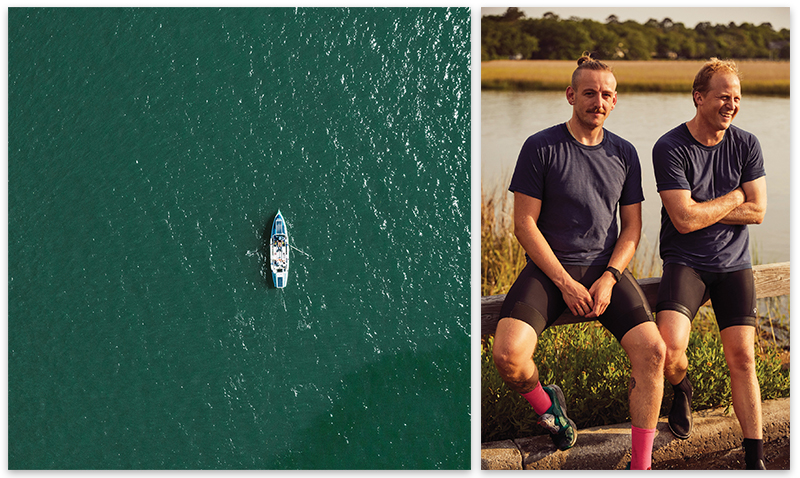Find out how Ben Towill and Charlie Layton are training for the two-month Talisker Atlantc Challenge endurance race

Neither Ben Towill (left) nor Charlie Layton had rowed a boat before they starting practicing on Shem Creek 18 months ago.
To most people, bobbing around the middle of the ocean in a boat without a motor is the stuff of nightmares. But for Ben Towill and Charlie Layton, it’s the fulfillment of a dream the two British expats have harbored for more than a decade.
When Towill, co-founder of Basic Projects (Post House, Sullivan’s Fish Camp), hired Layton to helm Basic Kitchen, the chef shared his ambition to compete in the Talisker Atlantic Challenge, a 3,000-mile race from the Canary Islands to Anguilla. Coincidentally, Towill had long had the same dream. This December, they’ll set off on the two-month, unsupported expedition across the Atlantic. Fewer than 1,000 people have ever completed the crossing without sails or a motor in modern history. Planning for the venture began during COVID, including securing and purchasing their vessel, a Rannoch Adventure R25 they’ve dubbed Polly Anne, after their grandmothers.
“It’s the execution of it all that really appeals to me.”
—Ben Towill, co-founder of Basic Projects and one half of the Dreamboats rowing team
During the crossing, Towill and Layton will take consecutive, nonstop shifts of two-hours on, two-hours off at the oars. “Charlie is very optimistic about everything, which I love, but I’m not,” laughs Towill, who compares their schedules to sharing night duties for a newborn. Layton says that as they increased their practice rows from four to six hours and then to overnight trips along the coast, he’s gained confidence in their dynamics as a duo. “I’m not sure there’s anybody else I’d be able to do this with,” Layton admits. “Even my childhood best friend, I’d probably kill him by the second day.”
Playlists created by friends, a library of pre-downloaded audiobooks, and plenty of sea life will fill the arduous days and nights as the two muscle their way across the ocean, with swells as high as 20 feet. Nodding—with tongue in cheek—to the quixotic nature of their quest, the pair adopted the team name, the “Dreamboats.” Neither had ever rowed on water before their first practice on Shem Creek, 18 months ago. Equally daunting were the fundraising requirements. After a long search, backing from Charleston-based Modern Minds and Synchronicity, connected mental and physical health businesses, provided the financial kick start to buy the boat.

(Left) The Dreamboats, aka Ben Towill and Charlie Layton, practice rowing in Polly Anne for the Talisker Atlantic Challenge, a two-month endurance race across the Big Pond starting in early December; (Right) Charlie Layton and Ben Towill plan to row from the Canary Islands to Anguilla in the Talisker Atlantic Challenge this December.
The Dreamboats then aligned with the Green Heart Project, a local nonprofit that provides garden-based learning at more than a dozen area schools. Through donations and sponsorship of their miles, they strive to raise $300,000 to improve the outdoor teaching facilities at each Green Heart location. “We want to build incredible outdoor classrooms that provide shade and a place for a community market, to really make the gardens a part of the schools,” says Towill.
Another $100,000 of their fundraising goal will support the 2041 Foundation, which works to preserve Antarctica from resource-hungry companies and nations. Towill has traveled to the southernmost continent with founder/explorer Robert Swan—the first person to walk to both the North and South Poles—and hopes to send Green Heart educators on a similar expedition. But first, he and Layton have to complete their own journey. After the Polly Anne arrived in Charleston in April, their coach, Duncan Roy, flew in to help prepare the boat. “It’s very intimidating going from a simple open-water cruiser that you learn in, and then this 25-foot spaceship appears,” says Layton. “I could tell where to sit and where the oars go, but everything else was alien.”
The two learned how to navigate, use their solar panels, distill water, cook dehydrated food, and use the head (a bucket). While at sea, they’ll have a satellite phone to check in with Roy and their families, but if bad weather sets in, there’s no way to coordinate a rescue in the middle of the ocean. They’ll deploy their parachute anchor to stabilize the boat and ride it out. To the list of potential perils, add seasickness, hallucinations, and the mental pressure of monotony.
To the Dreamboats, it’s all worth it. “It’s the execution of it all that really appeals to me,” says Towill. “This is a race for people who want to push themselves to do the hardest thing they can.”
Learn More:
Donate to the Dreamboats’ GoFundMe at dreamboats.us/shoreteam.
WATCH the Dreamboats launch video here.